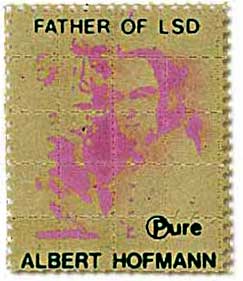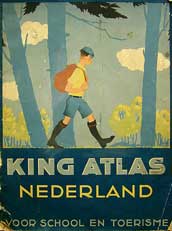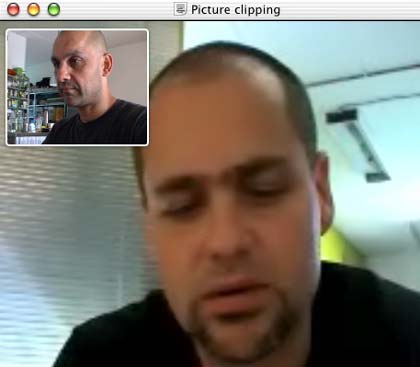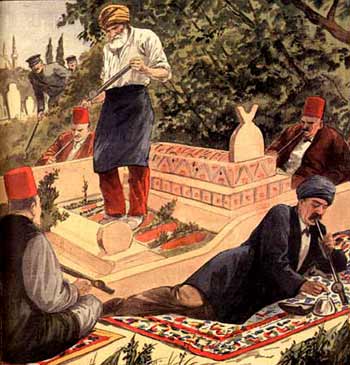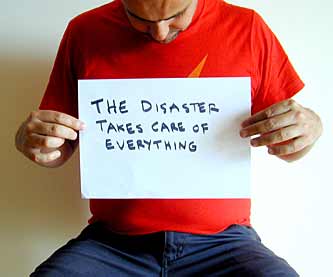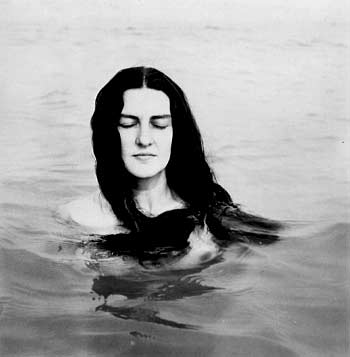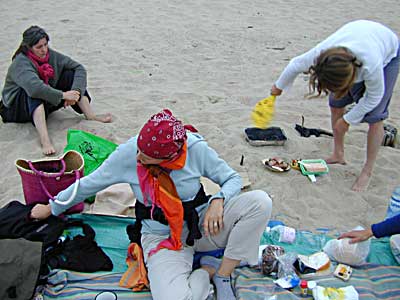|
|

|
||||||||||||||||||||||||||||||||||||||||
|
|
Present Past Subjects Projects Misc |
JULY 2003
Slightly crooked stamp. Tilted Rooms I was fascinated by this subject during the Microgravity Seminar at V2 last week. Especially intriguing was the material shown by Dr. Willem Bles of the TNO who lectured on 'Gravity and the Subjective Vertical.' Here's some links on the use of the tilted room effect in 20th c. amusement parks: Mystery Spots explained at SandlotScience.com History of the Tilthouse at Dark Rides and Funhouse.org Re: the bicycle ride -- slightly off-topic but because N. and I just the other day talked about his April 1943 bicycle ride home from the Sandoz lab -- a link to an interview with Albert Hofmann by Stanislav Grof (PDF). Excellent, excellent, excellent Bergman site. Watched Paul Sixta's new 'vampire' film at the Teek Festival in Breda this afternoon. Deep Sea Crypto-Zoology Following April's colossal squid find. Chilean blob found on the beach last week. More than 200 new species found in the Tasman Sea (via Rogério). It would appear that three twentieth century philosophers have pretty much mapped out the hell game (hell being the most fundamental form of ontological instability): for Heidegger - hell is death, for Sartre - hell is freedom, and for Levinas (never mind what Sartre says!) hell is other people. To Do
Russian Doll Treatment Watched this evening and greatly enjoyed: Vanya on 42nd St., "a film by Louis Malle of André Gregory's 'Vanya' based on Anton Chekhov's 'Uncle Vanya' adapted by David Mamet". Must explore more Chekhov. And what about these Mamet adaptations? Grove Press publishes three of Mamet's Chekhov modernizations: The Cherry Orchard, Three Sisters and Uncle Vanya.
(Mailed to Ewan.) Apropos the prospect of the Self as fiction (as expressed in narrative psychology (link and link) and Dennett's The Self as a Center of Narrative Gravity) my attention has been drawn to Jose Ortega Y Gasset's essay History as a System. Googlewhacking the phrase "Tautological Art" this afternoon (not really, I was looking for a definition but Google only returned 3 hits...) I came across this paragraph:
Follow up games design: the Six Simulations node on Everything2. Finished Endgame. A line from Clov's last soliloquy reminded me of my good friend Stewart:
The question raised by Max Frisch's 1958 play The Firebugs: A Morality without a Moral (Biedermann and die Brandstifter) is both fascinating and familiar... in its horror. "At what moment do victims become accomplices to their own disaster?" An Amazon reviewer describes the plot as follows:
Funny, I was just thinking that it was time that someone brought out a digital compact camera with a built in GPS (to provide a location stamp) and lo and behold it is there: the Ricoh Capilo Pro G3 (via Gizmodo). Augusto Boal: Games for Actors and Non-Actors. Sunday Movie Day Watched Takashi Miike's Visitor Q (Bizita Q) this afternoon (yes, yesterday we posted a story about inviting a stranger into the house -- there must be something in the air...). Visitor Q is very strange, very disturbing, and despite all this, even comical at times. To reach a corresponding level of familial dysfunction and comedy you've got to think back to a film like Lynch's Eraserhead. But Miike isn't Lynch. Miike is on a production roll (releasing a record number of 9 films in 2002!) and his style is his own (though this review of his recent film Gozu calls Gozu "an utterly bizarre excursion into almost Lynchian realms of post-logic"). Later N. and I finally got around to watching Hideo Nakata's Ringu. Ringu was a big disappointment. We'd expected more. (Was the recent American remake any better?) iChat AV public beta. What is very cool is that you can use your firewire enabled DV camcorder not only as an expensive webcam but as a video source -- ie. by simply pressing play you can send your video content streaming across the net to others.
(Rogério Lira 15:09 GMT+2) Watched Fernando Arrabal's Viva La Muerte last night. Cult Films In the mid-70's, like many others, I was captivated by Roland Topor's animation film Fantastic Planet and slightly shocked by Alejandro Jodorowsky's two films, The Holy Mountain and El Topo (apparently El Topo was the first film to be associated with the word "cult"). What I didn't know until last night was that the two artists were connected with Arrabal -- that the talented Topor (who besides being a graphic artist also wrote the novel which was the basis of Polanski's 1976 film The Tenant (Topor's text online) and played Renfield in Herzog's Nosferatu) and Jodorowsky together with Arrabal had once formed an anarcho-surrealist group called the Panic Movement. Inspired by Artaud the three had performed chaotic theatre "mainly in Mexico" during the 1960s. Another thing I didn't know: Jodorowsky was actually slated to be the first director of 'Dune' (before David Lynch picked up the project). The End of Time More accessible than the Edge interview, Discover magazine's December 2000 interview with Julian Barbour (author of The End of Time).
See too: My 06.02.02 entry: Ammunition for the Deconstruction of Time. Killing Time a Dutch documentary over Barbour by Ijsbrand van Veelen. Chapter one of 'The End of Time' (NY Times). Review of the book (NY Times).
Turkish gentlemen smoking opium on a tomb. (A confluence of circumstances this evening resulted in my being able to finally fulfill a long term desire.) Meetings:
Still talking about the premise of Max Frisch's play: The Firebugs (5 July) and the slow-motion-car-accident horror of inviting disaster into your home, N. mentions the place of prophecy in tragedy: Sophocles' Oedipus is told he will kill his father and marry his mother; in the hospital scene at the start of Topor and Polanski's 'The Tenant' Trelkovsky (unwittingly) sees himself and his future predicament. Speaking with Michael Murtaugh yesterday about database design and programming got me so excited that I pulled out the venerable 'purple book' (Smalltalk-80 The Language) and downloaded the latest version of Squeak. I don't have time for this. Spent the whole day playing around in Squeak. Discipline. Discipline. Discipline. Discipline. Got up early. Finished reading Elias Canetti's play The Numbered which Stefan K. so graciously photocopied and bound for me a couple of summers ago (July 2001). Read Philip K. Dick's 1978 lecture 'How to Build a Universe That Doesn't Fall Apart Two Days Later' (Google link). This I downloaded last October. Even if you don't normally enjoy Dick's fiction this is amazing stuff, especially if you are interested in pre-Socratic philosophy and gnosticism (or time anomalies). Strange... last time I Iooked this text was difficult to find. Now it seems to have proliferated all over the net. Quote:
Four words:
Exciting New Software This is the sort of non-linear word processor that I like: MacJournal (Cocoa application. Don't be put off by the name. A lot of people are using it for non-journal project writing. And it's free.) Palindromes Jalal Toufic writes in (Vampires):
Interesting. But what about the palindrome that occurs where there is no time (as in Barbour's theory) and existence is composed of separate frozen instants (nows)? In the middle of each of these moments one can legitimately wonder whether one is traveling forward or backward: every moment is perceived as a near death experience, a crisis. Every moment becomes a palindromic turning point. Jalal again:
Erika Greber in A Chronotope of Revolution: The Palindrome from the Perspective of Cultural Semiotics writes:
This morning I watched Michel Gondry's 'Sugar Water' clip for Cibo Matto. Amazing. Gondry, using a split screen and a palindromic effect, turns a violent moment (chronos topos) into the turning point of an elaborate pattern.
Moroccan cookies Groningen. Jente's birthday. N & I travelled up here yesterday to celebrate with J. and her family. Snuck out for a few hours to see if my favorite antiquariat bookstore had copies of Nabakov's An Invitation to a Beheading and Strindberg's A Dream Play. No such luck. I did, however, find a lovely hardcover edition of Artaud's The Theatre and its Double and a worn paperback of J. B. Priestly's 'Three Time Plays' (Dangerous Corner, Time and the Conways, I Have Been Here Before. See review links of the plays: 10 November 2002 entry). Oh, and I bought a wayang golek (Indonesian rod puppet). March 1964 Henry Corbin writes Mundus Imaginalis, an essay on the 'Alam al-Mithal' (the Imaginal Realm).
Rogério came to Rotterdam so we could do some preparatory work for our film. Watched Pasolini's Oedipus Rex. Bought an orchid. Read a play (Priestley's Dangerous Corner). Constrained Literature (Think Oulipo -- Ouvroir de Littérature Potentielle.) Searching for examples of line-unit palindromes (see 'Doppelgänger' below) I stumbled across this great table of forms at Spineless Books.com. Interesting site. Must remember to go back for more. (See too: Bibliography of Palindromic and Formally Perfect Literary Works.)
Read J. B. Priestley's 'Time and the Conways' (Priestley's take on J. W. Dunne's 'Serial Time'). Best line of the play (Kay Conway on her 40th birthday and feeling pessimistic): "There's a great devil in the universe, and we call it Time."A Roman palindrome: 'In girum imus nocte et consumimur igni' (we go into the circle by night and are consumed by fire) is also the title of the last film of Guy Debord (reviewed). Spent a few hours in Delft this morning, then travelled on to Amsterdam. Found 'A Dream Play' by Strindberg as well as a book of Cocteau's plays. Had dinner with Jouke at Cafe de Jaren. Read 'A Dream Play'. Not as good as I remember it. Want to re-read Sylvie and Bruno.
Harry Callahan. Eleanor. Chicago, 1949. N. and I visited Zeeland this week-end to meet up with her sister and two Parisian friends who had decided to come up to Holland to buy 'Dutch bikes'. Thus a good part of Saturday was spent in lovely Middelburg: first in a bike store and then in a parking lot figuring out how to attach the 3 new purchases to a French car.
Saturday evening: On the beach near Domburg. From left to right: Rose, Anja (N.'s sister), Frank.
Sunday morning: A snail glides slowly by on the inside of our tent fly. Orphée On the train home on Sunday I read Cocteau's play Orphée. At first I was quite surprised at the differences between the play and the film but since the play was produced in 1926 and the film released twenty-three years later (in 1949) I suppose it's more surprising that Cocteau managed to maintain his association with the theme over such a long period of time. While some differences are merely technical -- in the film Orpheus decrypts the underworld's messages via his car radio, in the play he interrogates the spirit world via his horse's tapping hoof -- in many areas the film goes far beyond the scope of the play. In both play and film Cocteau uses a mirror as the underworld entrance but only in the film do we actually accompany Orpheus through the mirror on his necronautical adventure. And further: only in the film does Orphée fall in love with Death (in the shape of leather-clad Maria Casares). This is not to say that the play is without charm. I particularly liked the complicated method whereby Death and her assistants 'take' Eurydice.
Twin
A font that changes with the outside temperature. (Type designers Erik van Blokland and Just van Rossum of LettError have designed a 'moveable' type for the twin cities of Minneapolis and St. Paul...) The Other and the Other's Slaves If, like me, you are interested Orientalism (or interested in paintings of lascivious Odalisques!) you may appreciate this site and this site. It's amazing... the instruction to "hide your head" has come today as something of an epiphany. Freestyle just got a lot easier. (I've ordered the Triathlon book and DVD.) Swimming will never be the same.
ALAMUT.COM is artist owned and operated.
|
|
||||||||||||||||||||||||||||||||||||||
